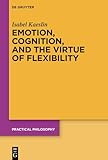Emotion, Cognition, and the Virtue of Flexibility / Isabel Kaeslin.
Material type: TextSeries: Practical Philosophy ; 26Publisher: Berlin ; Boston : De Gruyter, [2023]Copyright date: ©2023Description: 1 online resource (VIII, 178 p.)Content type:
TextSeries: Practical Philosophy ; 26Publisher: Berlin ; Boston : De Gruyter, [2023]Copyright date: ©2023Description: 1 online resource (VIII, 178 p.)Content type: - 9783110780826
- 9783110780970
- 9783110780932
- 100
- online - DeGruyter
- Issued also in print.
| Item type | Current library | Call number | URL | Status | Notes | Barcode | |
|---|---|---|---|---|---|---|---|
 eBook
eBook
|
Biblioteca "Angelicum" Pont. Univ. S.Tommaso d'Aquino Nuvola online | online - DeGruyter (Browse shelf(Opens below)) | Online access | Not for loan (Accesso limitato) | Accesso per gli utenti autorizzati / Access for authorized users | (dgr)9783110780932 |
Frontmatter -- Acknowledgments -- Contents -- Introduction -- Chapter 1: Emotional Response as a Normative Guide -- Chapter 2: Feeling States and Cognitive States -- Chapter 3: Against the Identification of Normativity with Rationality -- Chapter 4: The Virtue of Flexibility and the Unity of Feeling and Cognitive Capacities -- Chapter 5: Spontaneous Aversion and Attraction in “Good Thinking” -- Conclusion -- Bibliography -- Index
restricted access online access with authorization star
http://purl.org/coar/access_right/c_16ec
Should emotions play a role in our decisions, even if they are "just feelings" and not necessarily "imbued with reason" or cognitively penetrated? The author shows that such basic feelings as aversion and attraction can be important normative guides by disrupting engrained habits and beliefs, enabling us to reconsider our ways, which is important due to the ever-changing nature of ethical demands on us. Therefore, these feelings should guide our decisions, even if they are not cognitive. This book fi lls a gap in the philosophy of emotions, ethics, and virtue epistemology.
Issued also in print.
Mode of access: Internet via World Wide Web.
In English.
Description based on online resource; title from PDF title page (publisher's Web site, viewed 26. Apr 2024)


